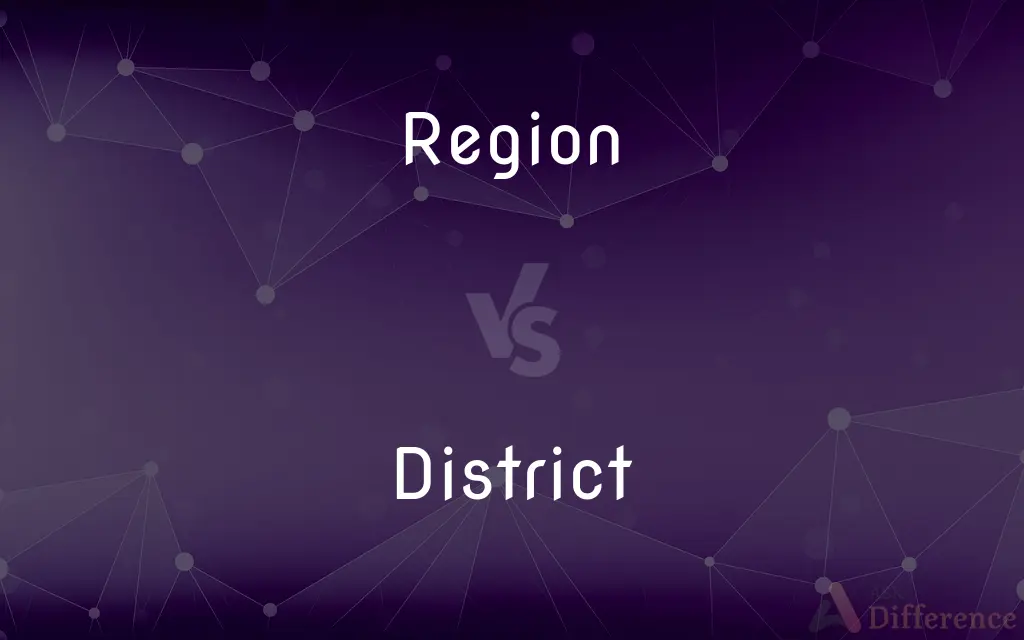Region vs. District — What's the Difference?
By Maham Liaqat & Fiza Rafique — Updated on April 8, 2024
A region is a broad geographical area defined by certain distinctive characteristics, whereas a district is a specific administrative division within a country, city, or region, often with defined boundaries and governance.

Difference Between Region and District
Table of Contents
ADVERTISEMENT
Key Differences
A region encompasses a wide geographical area that can be identified by natural, social, or economic characteristics that set it apart from other areas. On the other hand, a district refers to a smaller, more specific area within a country, state, or city that has been delineated for administrative purposes. Districts usually have a defined governance structure, including local governments or administrative units, and are established to facilitate effective local governance, planning, and service delivery.
Regions can vary in size and scope, encompassing vast areas that may span across multiple countries or encompassing smaller, more defined areas within a single country. In contrast, districts are delineated with precise boundaries and are recognized as official administrative units by governmental authorities. The establishment of districts is often driven by the need to organize land and population for governance, resource distribution, and legal administration.
While the concept of a region is flexible and can be applied based on various criteria (such as wine regions defined by viticultural characteristics or climatic regions defined by weather patterns), the concept of a district is tied to administrative and governmental functions. Districts are instrumental in organizing elections, local governance, and public services, including education, healthcare, and law enforcement.
Regions and districts also differ in terms of governance and political authority. Regions may be recognized in governmental policies and may influence administrative decisions, but they do not possess the same level of political authority or administrative infrastructure as districts. Districts, being specific administrative divisions, play a direct role in governance, with officials either elected or appointed to manage local affairs, implement policies, and oversee services within their boundaries.
Despite their differences, regions and districts both play crucial roles in geographical, cultural, and administrative categorizations. While regions help in understanding the broader geographical and cultural landscapes, districts facilitate the practical aspects of governance, planning, and community services at a more localized level.
ADVERTISEMENT
Comparison Chart
Definition
A broad geographical area with distinctive characteristics
A specific administrative division within a country or region
Scope
Can be large, spanning multiple countries, or smaller within a country
Smaller, with precise administrative boundaries
Characteristics
Defined by natural, social, or economic traits
Defined by governmental or administrative purposes
Governance
May influence policies but lacks direct administrative authority
Has defined governance structures for local administration
Purpose
Identifies areas based on shared traits or characteristics
Facilitates effective governance, planning, and service delivery
Compare with Definitions
Region
Utilized in different contexts to denote areas of interest.
Silicon Valley is a region globally recognized for its tech industry.
District
Defined by specific boundaries for governance purposes.
The school district boundaries determine which schools children in the area attend.
Region
A large area of land distinguished by unique characteristics.
The Pacific Northwest is a region known for its rainy weather and dense forests.
District
Plays a key role in local planning, governance, and services.
Health services are often organized and provided at the district level.
Region
Lacks specific administrative governance but may influence policy.
The Sahel region faces unique challenges that require tailored environmental policies.
District
An administrative division within a country, state, or city.
The Lake District in the UK is known for its stunning landscapes and lakes.
Region
Can be defined by various factors including climate, culture, or economy.
The Champagne region of France is renowned for its viticulture.
District
Has a structured governance and administrative setup.
The district council voted to increase funding for local parks.
Region
Broad in scope, potentially encompassing multiple administrative areas.
The Amazon rainforest region spans across several South American countries.
District
Smaller than regions, focusing on localized administration.
The district's emergency services were commended for their quick response to the crisis.
Region
In geography, regions are areas that are broadly divided by physical characteristics (physical geography), human impact characteristics (human geography), and the interaction of humanity and the environment (environmental geography). Geographic regions and sub-regions are mostly described by their imprecisely defined, and sometimes transitory boundaries, except in human geography, where jurisdiction areas such as national borders are defined in law.
District
A district is a type of administrative division that, in some countries, is managed by the local government. Across the world, areas known as "districts" vary greatly in size, spanning regions or counties, several municipalities, subdivisions of municipalities, school district, or political district.
Region
A large, usually continuous segment of a surface or space
The upper regions of the atmosphere.
District
A division of an area, as for administrative purposes.
Region
A portion of the earth's surface distinguished from others by some characteristic
The coastal region.
The region of storm damage.
District
A region or locality marked by a distinguishing feature
Went to the lake district for their vacation.
Region
A bioregion.
District
To mark off or divide into districts.
Region
A political district or unit, often with its adjacent lands
The Osaka region.
District
An administrative division of an area.
The Soho district of London
Region
An area of the body having natural or arbitrarily assigned boundaries
The abdominal region.
District
An area or region marked by some distinguishing feature.
The Lake District in Cumbria
Region
An area of interest or activity; a sphere
The region of gender studies.
District
(UK) An administrative division of a county without the status of a borough.
South Oxfordshire District Council
Region
An approximate degree or amount
Costs in the region of one billion dollars.
District
(transitive) To divide into administrative or other districts.
Region
Any considerable and connected part of a space or surface; specifically, a tract of land or sea of considerable but indefinite extent; a country; a district; in a broad sense, a place without special reference to location or extent but viewed as an entity for geographical, social or cultural reasons.
The equatorial regions
The temperate regions
The polar regions
The upper regions of the atmosphere
District
(obsolete) rigorous; stringent; harsh
Region
An administrative subdivision of a city, a territory, a country.
District
Rigorous; stringent; harsh.
Punishing with the rod of district severity.
Region
(historical) Such a division of the city of Rome and of the territory about Rome, of which the number varied at different times; a district, quarter, or ward.
District
The territory within which the lord has the power of coercing and punishing.
Region
An administrative subdivision of the European Union.
District
A division of territory; a defined portion of a state, town, or city, etc., made for administrative, electoral, or other purposes; as, a congressional district, judicial district, land district, school district, etc.
To exercise exclusive legislation . . . over such district not exceeding ten miles square.
Region
A subnational region of Chile; equivalent to province.
District
Any portion of territory of undefined extent; a region; a country; a tract.
These districts which between the tropics lie.
Region
(Ontario) regional municipality
District
To divide into districts or limited portions of territory; as, legislatures district States for the choice of representatives.
Region
Ellipsis of administrative region
District
A region marked off for administrative or other purposes
Region
(figuratively) The inhabitants of a region or district of a country.
District
Regulate housing in; of certain areas of towns
Region
(anatomy) A place in or a part of the body in any way indicated.
The abdominal regions
Region
(obsolete) Place; rank; station; dignity.
Region
(obsolete) The space from the earth's surface out to the orbit of the moon: properly called the elemental region.
Region
One of the grand districts or quarters into which any space or surface, as of the earth or the heavens, is conceived of as divided; hence, in general, a portion of space or territory of indefinite extent; country; province; district; tract.
If thence he 'scappe, into whatever world,Or unknown region.
Region
Tract, part, or space, lying about and including anything; neighborhood; vicinity; sphere.
Philip, tetrarch of .. the region of Trachonitis.
Region
The upper air; the sky; the heavens.
Anon the dreadful thunderDoth rend the region.
Region
The inhabitants of a district.
Region
Place; rank; station.
He is of too high a region.
Region
The extended spatial location of something;
The farming regions of France
Religions in all parts of the world
Regions of outer space
Region
A part of an animal that has a special function or is supplied by a given artery or nerve;
In the abdominal region
Region
A large indefinite location on the surface of the Earth;
Penguins inhabit the polar regions
Region
The approximate amount of something (usually used prepositionally as in `in the region of');
It was going to take in the region of two or three months to finish the job
The price is in the neighborhood of $100
Region
A knowledge domain that you are interested in or are communicating about;
It was a limited domain of discourse
Here we enter the region of opinion
The realm of the occult
Common Curiosities
How are districts created?
Districts are created through legislative or governmental decisions to organize land and population for effective governance and service delivery.
Do regions have any legal authority?
Regions themselves do not usually possess legal authority; however, regional designations can influence governmental policies and decisions.
Can a city be considered a region?
A city might be considered a region if it has distinct characteristics that set it apart, though it is more commonly referred to as a district within its broader administrative context.
What determines the boundaries of a region?
The boundaries of a region are determined by natural, social, or economic characteristics rather than strict administrative lines.
How do regions affect daily life?
Regions can affect daily life through cultural identity, economic activities, and environmental policies tailored to regional characteristics.
What role do districts play in education?
Districts often play a crucial role in organizing and administering public education systems, including school zoning, funding, and educational policies.
Are districts always governmental entities?
While most districts are governmental entities for administrative purposes, some districts may also refer to non-administrative areas recognized for specific purposes.
Can a district span multiple regions?
Typically, a district is contained within a single region, as it is an administrative division with defined boundaries.
Can the definition of a region change over time?
Yes, the definition and boundaries of a region can evolve due to changes in cultural, economic, or environmental factors.
How do regions and districts interact with each other?
Regions and districts interact in the context of governance, planning, and policy implementation, with districts often serving as the administrative units within larger regional frameworks.
Share Your Discovery

Previous Comparison
Soup vs. Sauce
Next Comparison
Affair vs. DealAuthor Spotlight
Written by
Maham LiaqatCo-written by
Fiza RafiqueFiza Rafique is a skilled content writer at AskDifference.com, where she meticulously refines and enhances written pieces. Drawing from her vast editorial expertise, Fiza ensures clarity, accuracy, and precision in every article. Passionate about language, she continually seeks to elevate the quality of content for readers worldwide.
















































